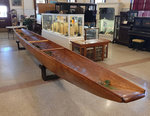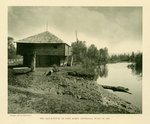

After our unprecedented year with closures stemming from the coronavirus pandemic, it’s easy to wonder how we’ll ever catch up from the losses suffered.
But we will. A look at the Lewis County Historical Museum can provide hope.
Nearly a decade ago, the museum was in danger of closing after the former director over a period of four years dipped into its $460,000 endowment until it dwindled to nothing. Debbie Knapp was arrested in November 2011, accused of embezzling $137,000. After negotiations, she pleaded guilty in May 2013 to four counts of first-degree theft, each count representing a year of thefts. She was sentenced to 14 months in prison and ordered to pay restitution.
But volunteers stepped in to keep the museum going, and with steady leadership and dedicated directors, it has rebuilt its restricted accounts to nearly $320,000, with $89,025 of that in an endowment fund.
“We’ve got limitations how we can get into that money,” Board President Peter Lahmann said at the annual meeting last week conducted on Zoom because of COVID-19. “If some disaster befell the museum, we would be able to access those funds to pay for whatever we needed to pay.”
However, tapping into the endowment account “just about takes an act of heaven,” he said.
Under rules adopted a few years ago, accessing money in the restricted accounts requires a vote of three-quarters of the board. To spend money in the endowment fund, the board must call a general membership meeting attended by at least 10 percent of total members, and three-quarters of those present must vote in favor of spending the money.
“We’re rebuilding it,” Lahmann said, adding that the goal has always been to build the endowment high enough to pay operating costs from interest earned. But with today’s low interest rates, he said, it would need to reach $5 million or $6 million to do that.
“If people send a check and it says endowment fund, that goes into the endowment fund,” Lahmann said. “If it doesn’t say endowment fund, we put it in one of the restricted investments.”
Money in the restricted accounts is invested.
“We took a middle-of-the-road investment strategy,” he said. “We didn’t go real conservative, and we didn’t go real wild either.”
It’s rather remarkable the museum ended 2020 with a net income of $62,324, which was down only $9,500 from the 2019 ending balance of $71,846, especially given state-mandated closures and cancellation of most fundraising events because of COVID-19. The museum receives funding from Lewis County and the cities of Chehalis and Centralia. This year, it also received $9,900 in a federal Paycheck Protection Program loan offered to organizations forced to close because of the pandemic.
Director Jason Mattson received praise from the board for his work keeping the museum solvent.
“I just want to congratulate Jason on doing a good job during this difficult time and keeping us on track and in the black,” Lahmann said. “We wouldn’t be seeing these numbers without all of his hard work.”
While income from events and visits to the museum dropped, so did expenditures.
“We had about 500 people this year compared to about 3,000 last year, so obviously we hope that changes,” Mattson said.
It’s uncertain whether Chehalis Fest and other summer events like the Pioneer Pie Social can take place this year, but the model train show is scheduled Oct. 9 and 10 at the Southwest Washington Fairgrounds.
“We have actually the second largest model railroad exhibit in a public building in Washington,” said Ted Livermore, who represents the model railroad group on the board. “Tacoma (Washington State History) Museum has the first.”
The large model railroad display, an educational exhibit, depicts Lewis County towns, including historic buildings.
Mattson said he’s hoping to schedule other events as pandemic restrictions are lifted.
“Some of my favorite things about doing this job are putting on events and all the coordination of that,” Mattson said.
He presented a Volunteer of the Year Award to Larry Black of Rochester who has digitized more than 600 oral history interview tapes from the 1970s and 1980s since he began volunteering at the museum in 2013.
Membership has also declined somewhat, from 300 to about 250, but Mattson said he’ll send out reminder notices. Susan Gonzales also proposed a membership drive with prizes.
Mattson said the museum has improved its website and accepted new donations, including a 1910 book of Western Washington artwork, a 1960s chess table with inlaid stone, a historic clock from the Masonic Lodge, and a turn-of-the-century dresser.
He’s hoping to organize a launch of the 25-foot-long canoe carved from a cedar log by Bob Antone of North Bend, which is on loan to the museum.
Volunteers are always welcome — washing windows, pulling weeds, sitting at the front desk, cataloging artifacts, digitizing photos. The next board meeting is March 16 at 5 p.m., either in person or via Zoom.
•••
Julie McDonald, a personal historian from Toledo, may be reached at memoirs@chaptersoflife.com.